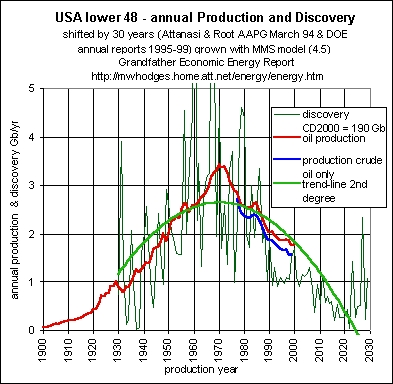Peak Oil
n Shell’s annual report, there is a subtle mentioning of a 134 mayor fall in oil distribution. 10752 barrels per day in 2005, against 12760 barrels per day in 2004. This is a drop of 15%. You couldn’t tell by looking at the profit figures, they kept growing.
 The American oil production already declined in the 1970’s. The downward trend in the US was about 35 years before the global downward trend in oil production.
The American oil production already declined in the 1970’s. The downward trend in the US was about 35 years before the global downward trend in oil production.
In May 2000, a famous Dutch politician Frits Bolkestein wrote in an open letter to the newspaper “De Volkskrant” about the underlying phenomenon: Peak Oil. What it boils down to is that oil production has peaked. The pressure has gone and now the oil doesn’t come to the surface as easily as before. The oil hasn’t been used up yet, not by a long shot, we are exactly halfway through it. It’s generally assumed the peak was in 2006 or 2007. For Shell it seams this peak was in 2004.
The same thing happened in the 70’s in the US oil production. The oil wells aren’t empty yet, but they yield less oil. New sources are found, but finding them and exploiting them, yields less than the reduction in production in other locations. We are talking about tens of thousands of wells that are producing less. Those few new big ones don’t really help.
What are the consequences of this peak? First, the media, the general, commercial media that is, doesn’t report on it, so the big companies keep this info to themselves. The goal Shell put itself is, when you read the annual report closely, to conquer the “alternative fuel market”, so they have a business to run in the long term as well. I haven’t seen any reaction from the side of the Dutch State. They just keep building motorways.
Oil prices are going up. A lot of people think petrol is expensive at Euro 1.30 per litre. It depends on your frame of reference, I tell them, just to get them going, that petrol will become 10 to 30 times more expensive than cauliflower. This is the end point where the price becomes stable. In other words, the balance won’t be reached below that ratio.
The consequence is that using your car to go to work becomes unaffordable. 30 or 40 km alone in your car, commuting? You’d better stay at home, you would make more. People will car pool, sleep at the company twice a week, change jobs or places of residence and eventually start using (horizontal) bicycles.
Also heating your house will cost a fortune. Start taking into account that a big expensive house looks nice, but an economic house is the house of the future. I remember the castles where it was great living in summer, but freezing cold in winter. The nobles lived in towns in winter, where they were close to a warm tavern. When you live on a farm, there is nothing to worry about. The cows emit enough heat that sleeping on the deal is luxury.